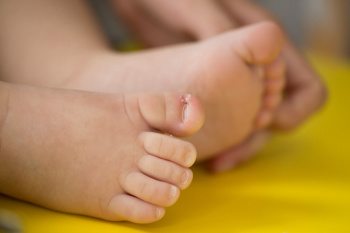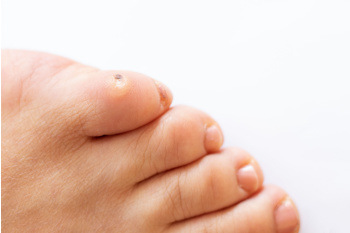February 2024
The Realities of Ingrown Toenails

Ingrown toenails occur when the edge or corner of a toenail grows into the surrounding skin, leading to pain, swelling, and potential infection. Typically affecting the big toe, ingrown toenails can result from a variety of factors. Improper nail trimming, such as rounding the corners or cutting them too short, increases the likelihood of ingrowth. Wearing tight-fitting shoes or high heels can exert pressure on the toes, contributing to the development of ingrown nails. Additionally, injury or trauma to the toe, genetic predisposition, and underlying health conditions like fungal infections or diabetes can elevate the risk. Ignoring ingrown toenails can lead to complications, including infections that may require medical intervention. Seeking timely attention from a podiatrist for ingrown toenails can help alleviate discomfort and prevent potential complications. If you have an ingrown toenail, it is suggested that you contact a podiatrist who can offer successful treatment options, which may include minor surgery for relief.
Ingrown toenails can become painful if they are not treated properly. For more information about ingrown toenails, contact the podiatrists of New England Family Foot Care. Our doctors can provide the care you need to keep you pain-free and on your feet.
Ingrown Toenails
Ingrown toenails occur when a toenail grows sideways into the bed of the nail, causing pain, swelling, and possibly infection.
Causes
- Bacterial infections
- Improper nail cutting such as cutting it too short or not straight across
- Trauma to the toe, such as stubbing, which causes the nail to grow back irregularly
- Ill-fitting shoes that bunch the toes too close together
- Genetic predisposition
Prevention
Because ingrown toenails are not something found outside of shoe-wearing cultures, going barefoot as often as possible will decrease the likeliness of developing ingrown toenails. Wearing proper fitting shoes and using proper cutting techniques will also help decrease your risk of developing ingrown toenails.
Treatment
Ingrown toenails are a very treatable foot condition. In minor cases, soaking the affected area in salt or antibacterial soaps will not only help with the ingrown nail itself, but also help prevent any infections from occurring. In more severe cases, surgery is an option. In either case, speaking to your podiatrist about this condition will help you get a better understanding of specific treatment options that are right for you.
If you have any questions please feel free to contact our office located in Milton, MA . We offer the newest diagnostic and treatment technologies for all your foot and ankle needs.
Common Causes of Foot Corns

Foot corns develop in response to the persistent pressure or friction exerted on specific areas of the feet. This pressure often occurs on the toes, the tops of the feet, or between toes, where bones are close to the surface of the skin. Various factors contribute to the formation of foot corns. Age-related changes in foot structure and biomechanics can impact gait and alter the way shoes fit, leading to increased friction and corn development. Wearing ill-fitting socks or shoes, whether too tight or too loose, can cause constant rubbing against the skin. Obesity can further complicate matters by causing abnormal weight distribution and contributing to foot deformities, like flat feet or hammertoes, which increase pressure on certain areas of the feet. Conditions such as osteoarthritis or diabetes also heighten the risk of foot corns. In the case of diabetes, peripheral neuropathy can impair sensation in the feet, making it difficult to detect and address areas of excessive pressure or friction. Consulting a podiatrist for persistent foot corns is suggested, as this medically trained foot doctor can provide personalized treatment and guidance.
If you have any concerns regarding your feet and ankles, contact the podiatrists of New England Family Foot Care. Our doctors will treat your foot and ankle needs.
Corns: What Are They? and How Do You Get Rid of Them?
Corns can be described as areas of the skin that have thickened to the point of becoming painful or irritating. They are often layers and layers of the skin that have become dry and rough, and are normally smaller than calluses.
Ways to Prevent Corns
There are many ways to get rid of painful corns such as wearing:
- Well-fitting socks
- Comfortable shoes that are not tight around your foot
- Shoes that offer support
Treating Corns
Treatment of corns involves removing the dead skin that has built up in the specific area of the foot. Consult with Our doctors to determine the best treatment option for your case of corns.
If you have any questions please feel free to contact our office located in Milton, MA . We offer the newest diagnostic and treatment technologies for all your foot and ankle needs.
Choosing the Right Shoes for Power Walking

Selecting the appropriate footwear is essential for a comfortable and effective power walking experience. Look for shoes specifically designed for walking, as they offer the necessary support and cushioning for prolonged activity. Opt for lightweight yet durable materials that allow breathability and flexibility, ensuring optimal comfort and performance. Consider shoes with ample cushioning in the heel and forefoot to absorb impact and reduce strain on the feet and joints. Look for a supportive midsole that provides stability and helps maintain proper alignment during each stride. Additionally, prioritize shoes with a roomy toe box to accommodate natural foot swelling and movement while minimizing the risk of blisters and discomfort. A supportive arch and a secure lacing system are also vital for a snug and stable fit. Take the time to try on different styles and brands, and pay attention to how each pair feels during walking movements. Investing in high-quality shoes that meet your specific needs can minimize the risk of discomfort or injury. Consult a podiatrist if you are seeking more information about what to look for while buying shoes.
Getting the right shoe size is an important part of proper foot health. Seek the assistance of the podiatrists from New England Family Foot Care. Our doctors will provide the care you need to keep you pain-free and on your feet.
Getting the Right Shoe Size
There are many people who wear shoes that are the incorrect size, negatively affecting their feet and posture. Selecting the right shoes is not a difficult process, so long as you keep several things in mind when it comes to choosing the right pair.
- When visiting the shoe store, use the tools available to measure your foot.
- Be sure there is ‘wiggle room’. There should be about an inch between your toes and the tip of your shoes.
- Do not always assume you are the same size, as manufacturers run differently.
- Purchase shoes later in the day, as your feet swell as the day progresses.
- If a shoe is not comfortable, it is not suitable. Most shoes can’t be ‘broken in’, and comfort should be the ultimate goal when it comes to choosing the right pair of shoes
As our feet hold our body weight and keep us moving, it is important to treat them right. Picking the right pair of shoes can provide your feet comfort and mobility without pain.
If you have any questions, please feel free to contact our office located in Milton, MA . We offer the newest diagnostic and treatment technologies for all your foot care needs.
Proper Footwear for a Productive Workday

In the hustle and bustle of our daily lives, the importance of wearing appropriate shoes often takes a backseat. However, the effect of choosing the right footwear for your workday cannot be overstated. The shoes you wear play a pivotal role in supporting your feet and maintaining overall well-being. Wearing ill-fitting or improper shoes can lead to a cascade of issues, from discomfort and fatigue to more severe problems like joint pain and posture issues. Investing in the right pair of shoes tailored to your work environment is an investment in your health and productivity. The correct shoes provide adequate support, preventing strain on your feet and lower limbs throughout the day. By prioritizing proper footwear, you not only enhance your physical comfort but also contribute to a more focused and effective work routine, setting the foundation for a successful and pain-free professional journey. If you experience any type of foot pain as a result of the shoes you wear while working, it is suggested that you consult a podiatrist who can offer treatment options.
While working on the feet, it is important to take the proper care of them. For more information about working on your feet, contact the podiatrists from New England Family Foot Care. Our doctors will treat your foot and ankle needs.
Working on Your Feet
Standing on your feet for long periods of time can cause stress and pain in your feet. Your whole body may experience change in terms of posture, back pain, bunions, callouses and or plantar warts. There are ways to avoid these conditions with proper foot care, smart choices and correct posture.
Positive Changes
Negative heeled shoe – Choosing this shoe type places the heel slightly lower than the ball of the foot. These are great for overall foot health. Find shoes that fit you correctly.
Go barefoot – Our feet were not designed to be enclosed for all hours of the day. Try to periodically expose your feet to air.
Eliminate Pain
Foot Exercises – Performing simple exercises, incorporating yoga and doing stretches are beneficial. This will allow increased blood flow to the area and muscles of the foot.
Achilles tendon – Stretching the foot out flat on the floor will relax the calf muscles and tendon. These exercises can be performed almost anywhere. Make sure you add these exercises to your daily regimen.
With a little bit of this information and knowing more about foot health, you will notice changes. Foot stretches and proper footwear will help with pain and prevent further issues.
If you have any questions please feel free to contact our office located in Milton, MA . We offer the newest diagnostic and treatment technologies for all your foot and ankle needs.









